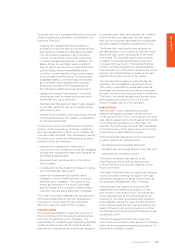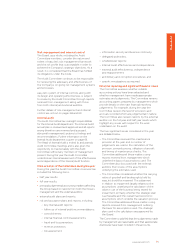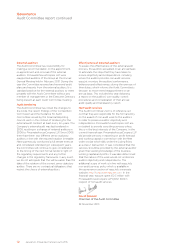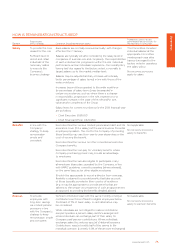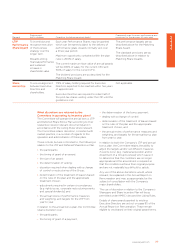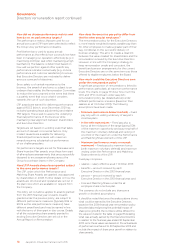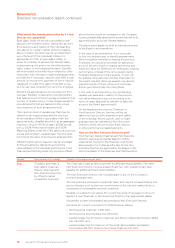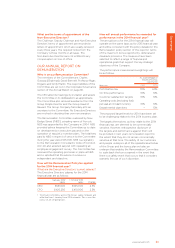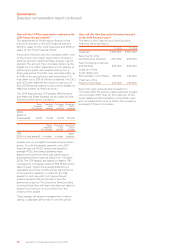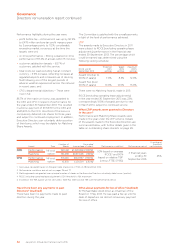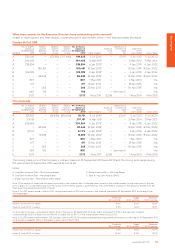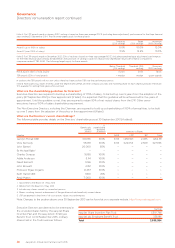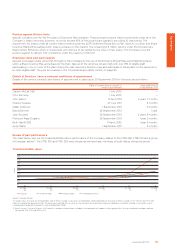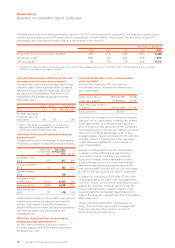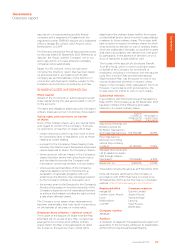EasyJet 2013 Annual Report Download - page 81
Download and view the complete annual report
Please find page 81 of the 2013 EasyJet annual report below. You can navigate through the pages in the report by either clicking on the pages listed below, or by using the keyword search tool below to find specific information within the annual report.
www.easyJet.com 79
Governance
£’000
Chief Executive Chief Financial
Officer
£4,042
Minimum
Performance
In line with
expectations
In line with
expectations
Maximum
Minimum
Performance
Maximum
5,000
4,000
3,000
2,000
1,000
Fixed pay
Annual bonus
£717
100% 37% 18%
100% 45%
31%
24%
24%
33%
43%
34%
33%
29%
49%
£445
£991
£1,880
£1,936
LTIP (Performance and Matching Shares)
What are the Executive Directors’ terms
of employment?
Under the Executive Directors’ service contracts
both parties are required to give 12 months’ notice
of termination of employment.
For Executive Directors, if notice is served by
either party, the Executive Director can continue
to receive basic salary, benefits and pension for
the duration of their notice period during which
time the Company may require the individual to
continue to fulfil their current duties or may assign
a period of garden leave.
The policy for a new hire would be based on
similar terms and will also include the ability for
easyJet to make a payment in lieu of notice of up
to 12 monthly instalments which would be reduced
if alternative employment was taken up.
Under the current CEO’s contract, the Company, by
mutual consent, may elect to make a payment in
lieu of notice equivalent in value to 12 months’ basic
salary, payable in monthly instalments which would
be subject to mitigation if alternative employment is
taken up during this time. Alternatively, this payment
may be paid as a lump sum. Bonus payments may
be made, payable in cash, on a pro-rata basis, but
only for the period of time served from the start
of the financial year to the date of termination and
not for any period in lieu of notice. Any bonus paid
would be subject to the normal bonus targets,
tested at the end of the year. The current CEO
has a contractual entitlement to such a pro-rated
payment under her service contract, other than
in the cases of resignation or gross misconduct.
These provisions do not apply to the CFO.
The Executive Directors’ service contracts and the
Non-Executive Directors’ letters of appointment are
available for inspection by shareholders at the
Company’s registered office.
What is our policy when an Executive Director
leaves or there is a takeover?
The rules of both schemes (LTIP and Deferred Share
Bonus Plan) set out what happens to awards if a
participant ceases to be an employee or Director
of easyJet before the end of the vesting period.
Generally, any outstanding share awards will lapse
on such cessation, except in certain circumstances.
If the Executive Director ceases to be an employee
or Director of easyJet as a result of death, injury,
retirement, the sale of the business or company
that employs the individual or any other reason
at the discretion of the Committee, then they will
be treated as a ‘good leaver’ under the plan rules.
Under the Deferred Share Bonus Plan, the shares for
a good leaver will normally vest in full on the normal
vesting date (or on cessation of employment in the
case of death) and if the award is in the form of an
option, there is a 12 month window in which the award
can be exercised. Awards structured as options which
have vested prior to cessation can be exercised within
12 months of cessation of office or employment.
Under the LTIP, a good leaver’s unvested awards
will vest (either on the normal vesting date or the
relevant date of cessation, as determined by the
Committee) subject to achievement of any relevant
performance condition, with a pro-rata reduction to
reflect the proportion of the vesting period served
(although the Committee has the discretion to
disapply time pro-rating if it considers it appropriate
to do so). A good leaver may exercise their vested
awards structured as options for a period of
12 months following the individual’s cessation of
office or employment, whereas unvested awards
may be exercised within 12 months of vesting.
In determining whether an Executive Director
should be treated as a good leaver and the extent
to which their award may vest, the Committee
will take into account the circumstances of an
individual’s departure. In the event of a takeover
or winding-up of easyJet (which is not part of
an internal reorganisation of the easyJet Group
in circumstances where equivalent replacement
awards are not granted) all awards will vest subject
to, in the case of LTIP awards, the achievement of
any relevant performance conditions with a pro-rata
reduction to reflect the proportion of the vesting
period served. The Committee has discretion
to disapply time pro-rating if it considers it
appropriate to do so. In the event of an internal
reorganisation, the Committee may determine,
with the agreement of the acquiring company,
that awards will be exchanged for equivalent
awards in another company.
What is the policy on Executive Directors holding
external appointments?
Executive Directors are permitted to accept one
appointment on an external board or committee
so long as this is not thought to interfere with the
business of the Group. Any fees received in respect
of these appointments are retained directly by the
relevant Executive Director.


